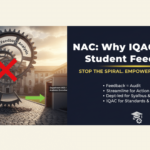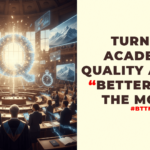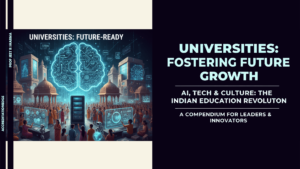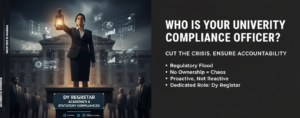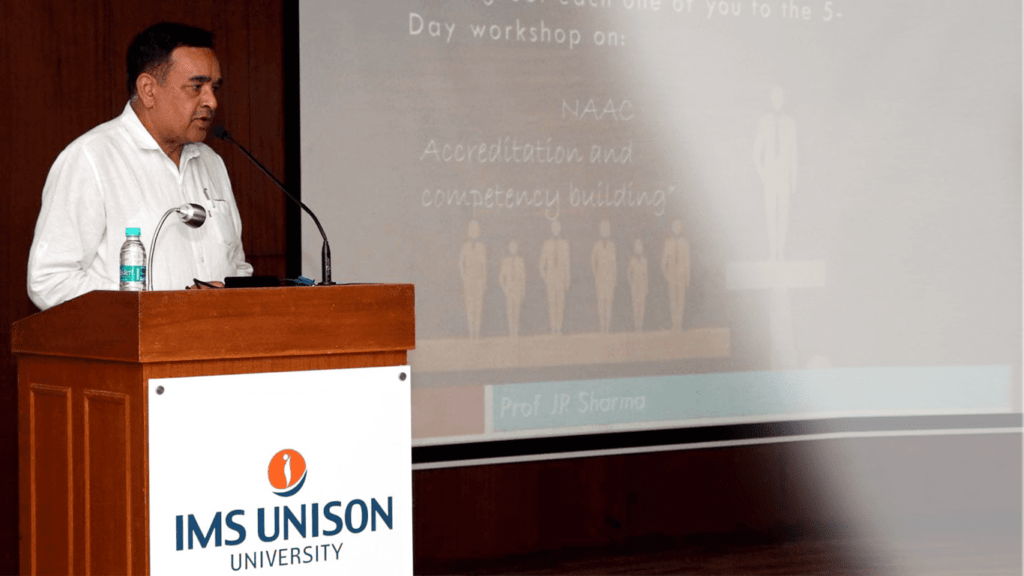“Get us A+ NAAC” is all that they say. A few would compound it by fixing a deadline of just a couple of months, enough for VCs and Directors to run hatter scatter. Only a few Founders and Chairmen endowed with sound academic experience understand what it takes to score an “A” series NAAC grade.
The next pressure point is activated by the Senate, Management and the Governing body asking their academic leaders and inclusive faculty to do all necessary preparations themselves and desist from seeking services of a consultant. It all sounds good. However, at the execution level of Heads of Departments and faculty, a stress is clearly evident in the following areas of traction:
1. There are, a large number of criteria which require certain data but the data doesn’t exist. If you don’t have the required data and numbers, institute won’t succeed in NAAC or NBA, forget a decent grade. If you manufacture data, you do an unethical work which could possibly also lead to a deviation, unacceptable in NAAC. So, what do you do? If you go back to the Leadership, you would often get a round-about answer, ultimately leaving the entire onus on you.
2. It is our experience that faculty doesn’t easily come in terms with data-connected activity. They feel that institutes should have an ERP-based central nodal point of information storage and all data/ information be retrieved from the same rather than faculty put into a routine clerical work. A number of them perceive this exercise as one eating into their academics and research endeavors.
3. Any change is hard to implement, at least in the initial stages. Out-come-based education (OBE) is a clear departure from the erstwhile teach-test-forget system. OBE relies on analysis of teaching-learning and curriculum and craves for graduated improvement. It is also a little hard to implement. This being an essential part of NAAC and NBA, it becomes inevitable for faculty to be a part of the system. It demands an utmost clarity, better delivered by a competent consultant.
4. It is unfortunate that Accrediting agencies haven’t handed down SSR which can easily be filled in by the faculty. It has some criteria which is impracticable to comply with. For example, NAAC criteria of Research and Consultancy as described in its SSR of July 2017, suddenly shifted its focus to ‘social extension’ particularly by the affiliated colleges. It carries very high marks. It demands institutes to produce record of work done in the neighborhood in the past 5 years on a number of specific initiatives. How will institutes go back in time and produce records on specific activities they never visualized would form part of NAAC? In an another case, OBE came up for implementation in the academic system from the year 2015. However, disregarding this, NAAC requires you to produce record of the past 5 years. How do you do that? There are a number of such frustrating inadequacies for the faculty of institutes.
5. Institutes will always do well by getting an audit of their preparations done. It is perhaps not quite safe to go for any accreditation without a mentor. Take a case of ABET, AACSB and other foreign accreditations, mentors have a big role to play. Institutes shouldn’t shy away from taking services of competent consultants, if it helps build their preparations to a new level of superior grades. ‘Accreditation Edge’, Higher Education Accreditation are some of the leading NAAC consultants in India and can be completely relied on, without a doubt.
Prof JR Sharma is a well-know mentor on NAAC , NBA and Foreign accreditation. The views expressed are personal.




